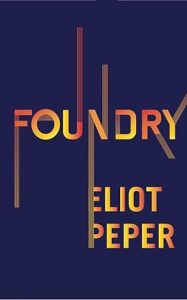I’ve been reading Eliot Peper’s books since 2016 when I picked up “Cumulus”. I often compare Peper’s style to that of Michael Crichton, master of the “near future” science fiction story. I had been looking for a replacement to that genre of book, my favorite genre, since Crichton’s death in 2008.

It’s hard to pick a favorite Eliot Peper book, but “Foundry” is near the top. In some cases, this book is a departure from Peper’s previous work in that it is not so “near future” as it is “present day”. I have no problem believing that everything that happened in “Foundry” is likely happening somewhere in the world today. Even the high technology in “Foundry” is likely 100% possible.
At its heart, “Foundry” is a spy thriller. It is narrated in the first person (another departure from Peper’s previous works) by Adrian, a cocky, snarky, American spy who, from the first line of the book makes you want to love him, or punch him in the face. He starts the book with, “It wasn’t that she was holding a gun to my head. It was that I could see the safety was still on. She thought I was completely at her mercy, which was what put her at mine.” That first line set the tone for the entire book. It is a series of delightfully unexpected conceptions and misconceptions from beginning to end.
The best part about “Foundry” is that it is a series of layered webs of intrigue. Adrian, the narrator sets his, while his foil in this story, Caroline, sets her own, that have her showing up regularly at unexpected times. Leia, Eliot’s overly ambitious and ruthless boss, also sets webs (plural), the most consequential of which has massive global geopolitical implications. Peper clearly researched this element deeply. That would be of no surprise to any of his long-time readers. The intricacy of this major plot point was frightening in its believability, and was a masterfully laid out “trap” by Peper (his word, not mine). Overall, the story itself was an alluring dance between Adrian and Caroline amidst a high stakes background. And it was fun.
Finally, one of my favorite things about Peper’s writing is that Eliot does not believe that “more is better”. He writes enough to tell a great story. Sometimes I buy books that are 400-500 pages long and they intimidate me before I even turn the first page. Peper’s books are always the perfect length, and often more well-developed than some of the “more is better” crowd. . “Foundry”, coming in at 229 pages, with very short chapters, would be a perfect book for a week at the beach.
Eliot Peper’s “Foundry” is available at Bookshop.org and at Amazon. You can also visit Eliot Peper’s website here. (His newsletter is great). Finally, if you are a Goodreads fan, follow Eliot Peper here.
